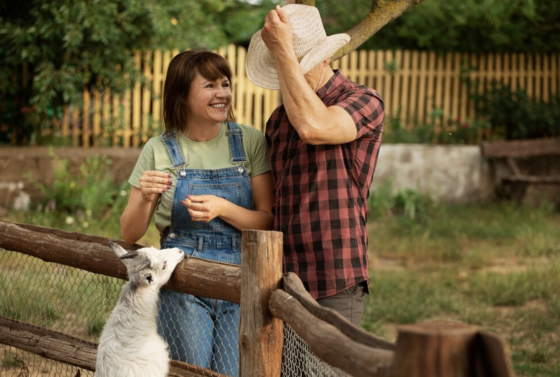By Charlene Roth
Sedona, AZ — Starting a small farm is more than just planting seeds and hoping for a good harvest—it requires strategic planning, hard work, and a deep understanding of the land. Whether you’re looking to grow organic vegetables, raise livestock, or create a specialty farm, turning a small farm into a profitable business takes a mix of passion and practicality. While farming can be a rewarding lifestyle, it also presents challenges that require careful financial management, efficient operations, and strong market strategies. By taking a step-by-step approach, aspiring farmers can lay the foundation for a thriving and sustainable business.
Choosing the Right Type of Farm
Before breaking ground, you need to decide what kind of farm best suits your goals, resources, and market demand. Options range from vegetable and fruit farming to livestock, poultry, or even niche markets like mushroom cultivation or beekeeping. Your choice should align with your climate, available land, and personal expertise while also considering consumer trends and profitability. A diversified farm model that includes multiple revenue streams—such as selling produce, offering agritourism experiences, or producing value-added goods—can increase resilience and income stability. Understanding the unique demands of each farming type will help you make an informed decision and set realistic expectations.
Securing Land and Resources
A farm’s success begins with its land, so choosing the right location is crucial. Whether you buy, lease, or repurpose family land, factors like soil quality, water availability, and access to markets should guide your decision. Conducting a soil test can help determine what crops or livestock will thrive on your land, while securing reliable water sources ensures long-term sustainability. Additionally, understanding zoning laws, permits, and regulations will help prevent legal issues down the road. Investing in the right infrastructure—such as greenhouses, fencing, irrigation, and storage facilities—early on can improve efficiency and productivity.
Creating a Business Plan for Profitability
A farm is a business, and like any other enterprise, it requires a solid business plan. This document should outline your farm’s mission, startup costs, expected expenses, revenue streams, and market strategies. Budgeting for equipment, seeds, livestock, and labor will help you avoid financial strain in the early years. Planning for scalability—such as expanding production, selling directly to consumers, or partnering with local businesses—can set the stage for long-term growth. By treating your farm as a business from the start, you increase your chances of turning a profit rather than operating at a loss.
Developing Business Skills with an Online Degree
Strengthening your business acumen is essential for running a profitable farm, and earning an online business degree can provide the knowledge needed to make informed financial and operational decisions. Understanding market trends, budgeting, and strategic planning can help turn a small farm into a thriving enterprise. The importance of a business bachelor’s degree lies in its ability to equip you with skills in accounting, business, communications, or management, all of which are valuable for making sound business choices. Online degree programs offer flexibility, making it easy to work full-time while keeping up with your studies, ensuring that you can apply what you learn directly to your farm business.
Understanding Your Market and Customers
Growing crops or raising animals is only half the equation—knowing who will buy your products is equally important. Conducting market research helps identify potential customers, whether they are restaurants, grocery stores, farmers’ markets, or direct consumers. Building relationships with local buyers and understanding seasonal demand can give you a competitive advantage. Offering unique or in-demand products—such as organic produce, heritage-breed meats, or specialty dairy items—can help your farm stand out. Additionally, setting fair yet competitive pricing ensures profitability while keeping customers satisfied.
Implementing Efficient Farming Practices
A productive farm depends on efficiency, which means using modern techniques to maximize yields and reduce waste. Sustainable farming methods—such as crop rotation, composting, and integrated pest management—can improve soil health and long-term productivity. Investing in time-saving equipment and automation, like drip irrigation or greenhouse technology, can increase output while reducing labor costs. Keeping detailed records of planting schedules, livestock health, and financial expenses allows you to refine operations and improve future yields. Efficiency not only saves time but also directly impacts profitability.
Marketing and Selling Your Farm Products
A strong marketing strategy can turn a small farm into a profitable business by expanding its reach and attracting loyal customers. Utilizing social media, a farm website, and email marketing helps connect with potential buyers and share updates about your products. Hosting farm tours, offering community-supported agriculture (CSA)subscriptions, or selling at local farmers’ markets can build a customer base. Partnering with local restaurants or grocery stores can create steady demand for your goods. Branding your farm with a unique story and high-quality packaging can further enhance its marketability.
Diversifying Income Streams for Stability
Relying solely on crop sales can make a farm financially vulnerable, so diversifying revenue sources helps ensure stability. Adding agritourism activities—such as farm stays, workshops, or pick-your-own produce events—can generate extra income while engaging the community. Processing farm products into value-added goods, like jams, cheeses, or herbal teas, can increase profit margins. Offering online sales, subscriptions, or delivery services can reach more customers and provide consistent revenue. A flexible and diversified approach to income generation can help your farm weather market fluctuations and seasonal downturns.
Starting a small farm and turning it into a profitable business requires careful planning, resource management, and smart marketing. Farming is not just about working the land—it’s about creating a sustainable and financially viable operation that grows with time. With the right strategy, dedication, and adaptability, your small farm can flourish into a thriving business that feeds both people and your passion.
Discover the vibrant community and cultural events of Sedona by visiting Sedona.Biz for the latest news and stories that shape





